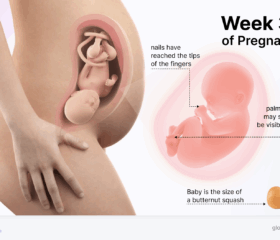Sleeping Soundly During Pregnancy: Finding Your Most Comfortable Position
When you’re pregnant, your body does a lot of amazing things—except sleep, apparently. Frequent backaches, bathroom trips, and other pregnancy symptoms can easily get in the way of your nighttime rest.

If you’re having trouble getting some good shut-eye, you’re not the only one. Up to 80% of moms-to-be women struggle with pregnancy insomnia. 1
Thankfully, you can catch some more zzz’s by changing up what pose you sleep in. Read on for an overview of the right and wrong sleeping positions during pregnancy.
Why is sleeping so important during pregnancy?
Sleeping is an important part of prenatal care that can affect you and your baby’s health in a few areas:
- Brain function: If you keep putting your keys in the fridge or forgetting why you just walked into a room, you’re probably experiencing “momnesia” or “pregnancy brain,” which can start as early as the first trimester and affects 50%–80% of pregnant women. 2 Poor sleep can exacerbate this symptom.
- Immune system: During pregnancy, your body suppresses your immune system to stop it from attacking your baby. This makes you more susceptible to certain bacteria, parasites, and viruses. 3 Getting enough sleep will help keep you healthy even when your immune system is on the fritz. 4
- Gestational conditions: A lack of sleep can contribute to hypertension and diabetes during pregnancy, which are risk factors for preeclampsia, a major complication. 5 6
- Labor difficulties: Getting fewer than six hours of sleep a night can contribute to a lengthier labor and a higher chance of needing a Cesarean section. 6 Try to aim for seven to ten hours.
What are the best sleep positions during pregnancy?
Every pregnancy is unique, and finding what works for you might take some time. With that said, most experts advise sleeping on your left side, at least from the second trimester onward.
The second trimester is when many women start finding stomach sleeping uncomfortable. Certain pregnancy symptoms also make sleeping on your back a no-go.
Side-sleeping’s benefits include: 7
- Pain relief: Many women get bad lower back pain when they’re pregnant. Lying on your side can help relieve it (or, at least, avoid making it any worse).
- Increased blood flow: The side-sleeping position reduces pressure on the vena cava, a major vein that pumps blood from your lower body to your heart. Compressing this vein, which can easily happen when you sleep on your back, can result in low blood pressure and dizziness.
- Improved organ function: This position takes the pressure off your internal organs, like your liver and kidney, which helps your body process waste. It also reduces swelling in your hands, ankles, and feet.
How can you make side sleeping comfortable?
Some people are natural side-sleepers, but others aren’t. If you fall into the latter camp, the answer is: pillows. Lots of pillows.
If you’re sore, numb or restless after trying to sleep on your side, experts recommend using at least three pillows to get comfortable.
The first goes under your head—not your neck and shoulder, just your head. You can place the second pillow between your bent legs, moving it around to find the best spot to alleviate the pressure on your hips or spine.
Lastly, tuck the third pillow under the sheets behind you to support your back. This should also stop it from getting nudged away or bumped off the bed during your sleep.
If you need a little extra relief, try placing a thin pillow or a thick blanket or towel under your bump to give it a little lift and ease the pressure.
Specialized pillows
Specialized pregnancy pillows are also worth the investment if you’ve got the cash. Common types include:
- U-shaped: The shape of these pillows offers support to both sides of the body, making them an ideal choice for side sleepers.
- C-shaped: The curve of these supports your spine, bump, and knees.
- Full-length: These are longer than your standard bed pillows and should be long enough to support your side sleeping from head to toe.
When you’re buying specialized pillows, remember to choose suitable materials. For example, cotton is breathable, which can keep you cool, and memory foam molds to the shape of your body, which is great if you really need extra support.
Sleeping positions to avoid
Again, sleeping on your stomach will probably be a non-starter once you get into the middle and later stages of your pregnancy, since it just won’t be comfortable.
You might still be able to fall asleep on your back—but you shouldn’t. As alluded to above, lying flat on your back for long periods in the second and third trimester isn’t a good idea, since it can pinch the vena cava, which carries blood to your heart and, ultimately, to your baby. 8
What if you wake up on your back?
Don’t panic. Just roll with it—right back over onto your left side.
Spending a little while on your back isn’t a huge deal, and your baby is almost certainly fine. It’s normal to shift positions while you’re catching up on some well-needed rest, so stay calm and try to get comfortable on your side again.
Are there ever times when you should sleep on your back while pregnant?
Lying flat on your back isn’t recommended, but there are some instances when sleeping in a slightly propped-up position can be more comfortable.
For example, if you’ve started experiencing heartburn (acid reflux) during your pregnancy, you can use a wedge pillow (or two to three standard pillows) under your back to slightly elevate yourself off the bed. This angle can stop your stomach acid from getting into your esophagus while keeping the pressure off your spine and vena cava.
Tips for sleeping well throughout your pregnancy
As you’re probably gathering, sleeping when you’re expecting can be tough. Here are some trimester-specific tips to help you get the rest you need:
Early-pregnancy sleep tips
In the first trimester, your main challenges will be your initial rash of symptoms, such as morning sickness. Try these strategies to get past them:
- Limit fluids before bed: Frequent urination is a common early-pregnancy symptom. The more you drink, the more you’ll need to go to the bathroom at night. Stay hydrated in general, but taper off the liquids an hour or two before bedtime.
- Keep snacks handy: If you get nauseous at night, you might want to keep healthy pregnancy snacks nearby. Starchy foods like crackers, noodles and toast (or plain bread) work well for this.
- Limit caffeine: It’s OK to drink caffeine while you’re pregnant, but you should limit it to no more than 200 milligrams—or one 12-ounce cup of coffee—per day. Continue to follow this rule throughout your pregnancy. It’s better for both you and the baby, and will make it easier to sleep. 9
You should also establish a relaxing bedtime routine (something that’s worth doing for everyone, not just pregnant mothers). Try to put down your phone—or tablet, or laptop—at least an hour before bed to stop your devices’ blue light from interfering with your melatonin production, the hormone in charge of regulating your sleep cycle. 10
Instead of using your gadgets, try having a warm bath, doing breathing exercises, or doing another activity you find calming. You should also train your body to go to bed at the same time every night, even on weekends.
Middle and late pregnancy sleep tips
When you enter your second (and, eventually, third) trimester, your pregnancy symptoms will change. While your nausea will probably fade, you might start to feel your baby kick, known as quickening, as early as week 16. By week 22, he’ll have settled into a sleep schedule of his own, but unfortunately, it might not coincide with yours. 11
Your growing uterus will also exacerbate symptoms like heartburn and pregnancy constipation, and can even lead to rib pain (another common complaint during pregnancy). All of these have the potential to keep you up.
Follow these tips to get as much rest as possible in the later stages of your pregnancy:
- Establish eating curfews: Your last meal should be around three hours before bed, especially if you suffer from acid reflux and indigestion.
- Change up your pregnancy diet: If you’re a hot sauce lover, this one might hurt. Spicy and acidic foods can irritate your digestive system, making heartburn more likely. Try switching to milder foods and prioritizing healthy sources of protein like lean meat and eggs. Adding more fiber to your diet with fruits and veggies can also help constipation.
- Eat smaller portions: While you might want to make sure that you and your baby are getting enough nutrients, it’s not necessary in the first six months of pregnancy. In fact, eating too much sugar and too many fats can lead to gestational diabetes. 12 Instead, try eating smaller portions more frequently.
- Maintain a cool temperature: If you’re feeling overheated (which can happen due to increased blood flow), try to keep your room cool. Your pajamas and bedding should also be made of soft, breathable materials like cotton and linen.
Just to reiterate, your second trimester is probably a good time to start sleeping on your left side. Remember to use as many pillows as you need to make sure you’re comfortable.
If you feel the urge, don’t be shy about sneaking in a quick nap during the day. Try not to let this throw off your nighttime sleep schedule, but the most important thing is to make sure that you get as much rest as possible, so do what you have to do.
Exercise can help alleviate restless legs syndrome
If you’re trying to sleep but your legs start itching, burning, tingling or throbbing, you’re probably experiencing a common sleep disorder known as restless legs syndrome (RLS). Light exercises like yoga, walking, and stretching are some of the best pregnancy workouts to alleviate your discomfort. You can also try prenatal massages and warm baths for relief.
Can you take sleep aids while you’re pregnant?
Watch out for sleep aids. Not all sleeping pills are safe for pregnant women or their babies. Always read the warning labels, and consult your doctor before taking any new medication.
In fact, if you’re really struggling, the doctor’s office should be your first stop. They may be able to prescribe you vitamins that’ll help with those annoying symptoms keeping you up at night, and they’re a good source of advice on any changes you plan to make to your diet or exercise routines.
Final thoughts
Throughout your pregnancy, remember to put your health and comfort first to ensure you get a good night’s sleep. If you need help but don’t have much of a support system, try using social media to find groups that provide assistance to expecting mothers who need it, whether it’s financial, emotional, physical or mental.
And be patient with yourself. You’re doing great, and you’ll continue to do great. Sweet dreams!
Article Sources
- Pakistan Journal of Medical Sciences. "Insomnia during pregnancy: Diagnosis and Rational Interventions" Retrieved April 29, 2025.
- The University of Texas Southwestern Medical Center. "Is ‘pregnancy brain’ real or just a myth?" Retrieved April 29, 2025.
- Best Practice & Research Clinical Gastroenterology. "The immune system and microbiome in pregnancy" Retrieved April 29, 2025.
- Physiological Reviews. "The Sleep-Immune Crosstalk in Health and Disease" Retrieved April 29, 2025.
- American College of Obstetricians and Gynecologists. "Preeclampsia and High Blood Pressure During Pregnancy" Retrieved April 29, 2025.
- Johns Hopkins Medicine. "Get a Good Night's Sleep During Pregnancy" Retrieved April 29, 2025.
- Stanford Medicine Children’s Health. "Sleeping Positions During Pregnancy" Retrieved April 29, 2025.
- University of Rochester Medical Center. "Sleeping Positions During Pregnancy" Retrieved April 29, 2025.
- American College of Obstetricians and Gynecologists. "How much coffee can I drink while I'm pregnant?" Retrieved April 29, 2025.
- INTEGRIS Health. "How Does Screen Time Affect Your Sleep?" Retrieved April 29, 2025.
- Louisiana Department of Health. "Stages of Fetal Development - Second Trimester" Retrieved April 29, 2025.
- Tommy’s. "How much should I eat in pregnancy?" Retrieved April 29, 2025.







